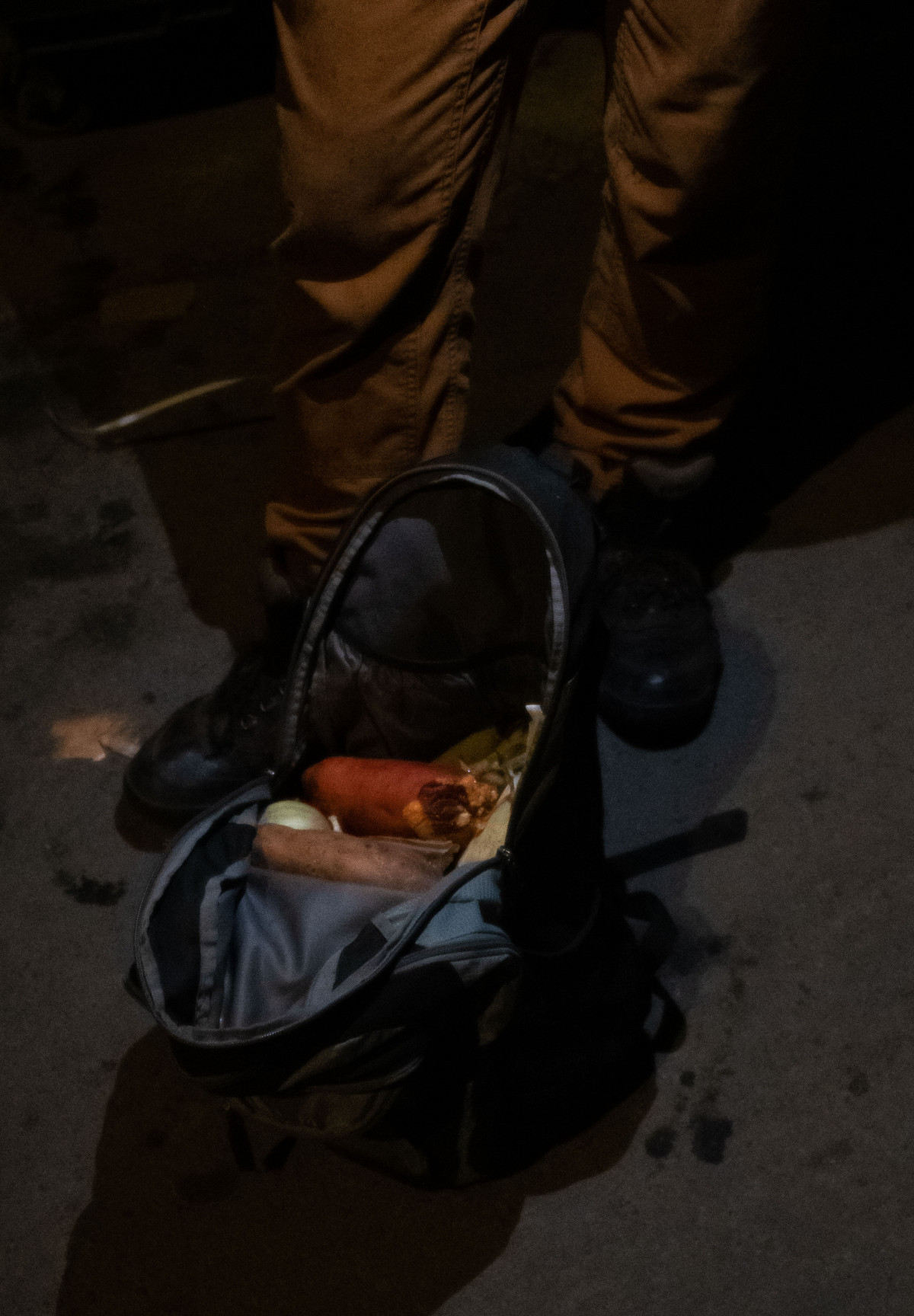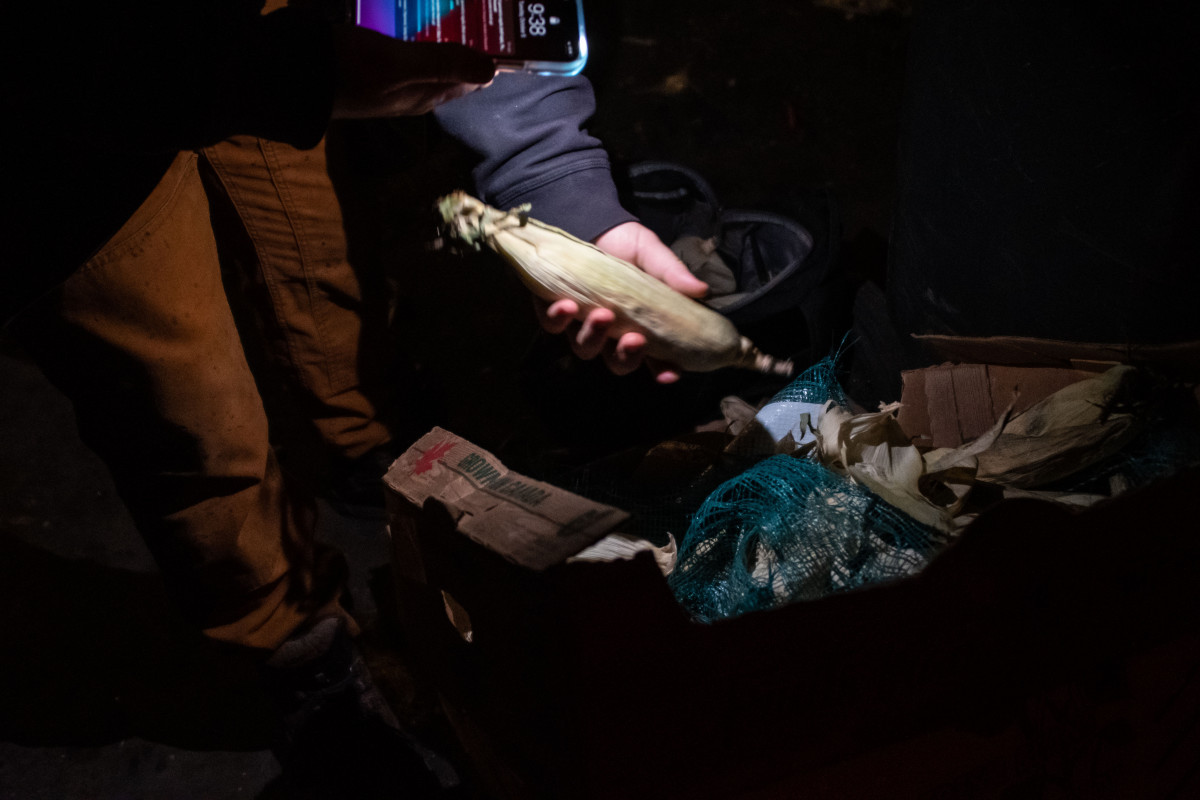Giving food a second chance one dumpster at a time
Divers take care not to over-pluck the spots they frequent, and leave the places as they found them. Photo Esteban Cuevas
What dumpster diving says about our relationship to food
”It was crazy. It was really beautiful food that looked like it was directly off the shelves of the grocery store.”
This is how Alex, a Montreal based artist who wished to not have their name disclosed due to privacy reasons, recalled the first time they went dumpster diving.
Alex became interested in dumpster diving when their roommate brought home food found while diving. The lockdown had greatly affected both their artistic income at the start of the pandemic, and with more time on their hands, Alex decided to try it out.
“I realized there was an abundance of food,” said Alex, who explained how dumpster diving, paired with the help of food banks, allowed them to put food on the table without having to step inside a grocery store since last October.
The practice of dumpster diving is simple. Usually, a diver travels to a few locations—any business that deals with food like grocery stores. Armed with multiple bags and a backpack, divers then scavenge for any edible food through boxes and dumpsters found in back alleys.
Sometimes, items that are still salvageable are displayed in containers left outside, or are left uncovered on top of plastic bags, allowing divers to easily grab what they need. Alternatively, they must either untie the bags and check what contents lie within, or they make a small hole on the sides to recover whatever is inside.
“Part of my motivation [is] to oppose exaggerated consumerism,” said Gabo Champagne, a Montreal-based multidisciplinary artist who has been dumpster diving for seven years. Like many other divers, Champagne is concerned about edible food being thrown away, and counteracts it by dumpster diving. “But also, I do it to feed myself in a less expensive way.”

“I have a very low income,” she said. “So it helps me live a better quality of life, because I can do dumpster diving and not be short with my money at the end of the month.”
There are many reasons to partake in this particular activity. However, most divers, like Champagne, feel strongly about salvaging the edible food that is thrown away.
“It's food waste,” said Em Clarke, who started diving last year during the pandemic after her income was affected. While saving money was a driving factor that incited the practice, Clarke wanted to salvage food that would normally be wasted.
“Everything that we pull out of here, we are perfectly comfortable eating or putting in our bodies. If we didn't do that, it would be going into a landfill site,” Clarke said. “There are so many areas of inefficiency in our entire food production cycle–from harvesting to shifting, to selling. It feels irresponsible to let this go to waste.”
Clarke pointed out that there’s nothing wrong with most of the food divers find, except for a few cosmetic imperfections, like an onion showing physical damage from a knife cut, or a carrot with an odd shape.
Some items have imperfections due to lack of freshness. In other common instances, food gets thrown out if not sold fast enough, and replaced by fresher products.
“Lots of [it] is perfectly good food that should be made available, regardless of its appearance,” said Clarke on stores that throw away food they can no longer sell. Instead, she wished they would find alternatives for people who could make good use of it.
“It makes no sense that we would throw out so much good food while some people on the planet are unable to have a meal a day,” said Champagne on the same subject. “I just don't see why I would ever decide to do grocery shopping while there is so much food in the garbage. It makes no sense to me.”
“There are so many areas of inefficiency in our entire food production cycle–from harvesting to shifting, to selling. It feels irresponsible to let this go to waste.” — Em Clarke
The divers pointed out a certain aspect of dumpster diving: the unpredictability of what you can find. Dumpster diving is an inconsistent way to put food on the table as one never knows what they will find.
“Sometimes you go around and you find nothing. Sometimes you’ll go and it's paradise on earth,” said Alex.
Champagne, who dumpster dives out a couple of times per week, says she once found a few lobsters that lasted her the entire week. On another occasion, she found a great amount of craft beer that lasted an entire month between her and her roommates.
“It’s the moment of my life where I ate the most quality food ever that I didn't get from my parents,” she said in relation to a time she was able to fill multiple bags with organic food.
Dumpster diving also comes with its own set of rules. Jumping fences or doing anything illegal is off the table, as is tearing open every bag in sight and leaving a mess behind.
Leaving a mess in a business’ backyard is one of the easiest ways to get a lock placed on a container, according to the divers. Staying for a few minutes, taking the necessities, and leaving the place as if one had never been there is one of the most crucial parts of dumpster diving etiquette.
For this reason, as Champagne pointed out, divers must maintain a certain balance when talking about diving locations. Even if it’s the community’s responsibility to guide beginners to places where they can dive, bringing too much attention to certain spots can attract unwanted attention by people who may not understand or disagree with the practice.
“It really disrupts the ecosystem of dumpster diving when spots are disclaimed to a lot of people,” said Champagne when asked about which general areas she goes to.

It is customary to only take what one needs, and leave the rest behind. If there is an abundance of food or produce, there could be others who could make use of it.
“You can’t take too much, because things don’t last super long,” said Alex. “You take what you can eat or [it gets wasted] and it’s not worth it. ”
Other barriers include social stigmatization since it is difficult to associate edible food with garbage, at least for people who know little about the dumpster diving practice.
Alex explained how dumpster diving being perceived as something dirty is an inaccurate idea spread by the media.
“Many people who may need it are not aware of it, so I think it’s important to talk about it,” said Alex regarding an occasion where they introduced dumpster diving to a friend that became unemployed due to the pandemic.
Champagne and Clarke mentioned how getting a foot in the door could seem intimidating at first. There is always a “certain psychological barrier” that needs to be crossed, as Champagne said.
According to all three divers, it is common to be introduced to the practice of dividing by friends or acquaintances. Similarly, there are social media groups and forums that exist for people to get acquainted with the rules and places to explore.
“I like to think of it as a communal activity,” said Clarke, who was first introduced by an experienced diver, and who regularly goes diving with roommates once a week.
Dumpster diving has its upsides and downsides, and there are many reasons to participate. While it is a response to food-wasting, Clarke pointed out its disadvantages.
“I cannot think of dumpster diving as a superior solution to more organized forms [of saving food],” she said. To Clarke, diving cannot fix food waste. She believes that other more organized forms of food services, like food banks, are more effective approaches. According to her, dumpster diving can be very time-consuming and unpredictable, she hopes for more organized solutions by local communities or by the government.
“I think we need to culturally move away from [wasting aesthetically imperfect food],” she said. “Systems must be put in place to funnel the food to [food banks or other similar institutions that could distribute it more efficiently.]”




